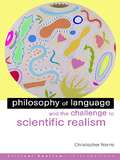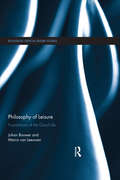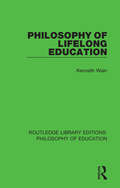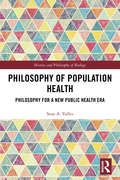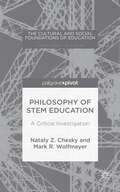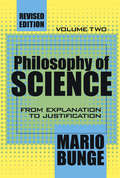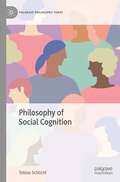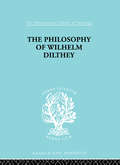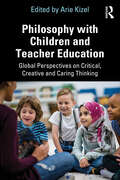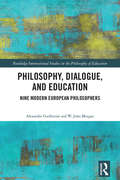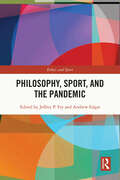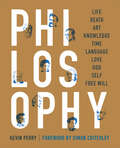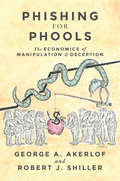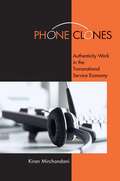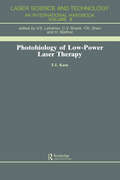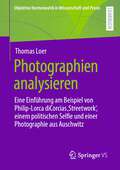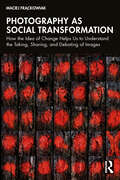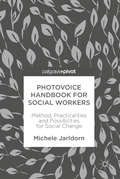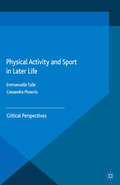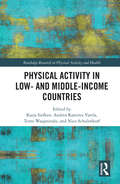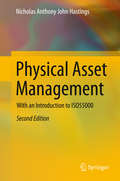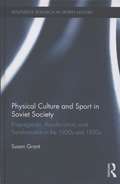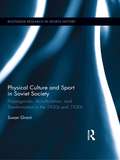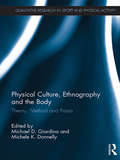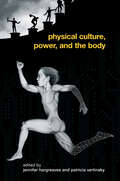- Table View
- List View
Philosophy of Language and the Challenge to Scientific Realism (Routledge Studies in Critical Realism)
by Christopher NorrisIn this book Christopher Norris develops the case for scientific realism by tackling various adversary arguments from a range of anti-realist positions. Through a close critical reading he shows how they fail to make adequate sense on any rational, consistent, and scientifically-informed survey of the evidence. Along the way he incorporates a number of detailed case-studies from the history and philosophy of science. Norris devotes much of his discussion to some of the most prominent and widely influential source-texts of anti-realism. Also included are the sophisticated versions of verificationism developed - albeit in very different ways - by thinkers such as Michael Dummett and Bas van Fraassen. Central to Norris's argument is a prolonged engagement with the once highly influential but nowadays neglected work of Norwood Russell Hanson. This book will be welcomed especially by readers who possess some knowledge of the background debate and who wish to deepen and extend their understanding of these issues beyond an introductory level.
Philosophy of Leisure: Foundations of the good life (Routledge Critical Leisure Studies)
by Johan Bouwer Marco van LeeuwenWhat is leisure? How does leisure relate to leading a good life? This critical and intelligent study interrogates the basic principles of leisure and demonstrates the continuing relevance of these questions for our society today. It not only explores the traditional philosophical concepts at the heart of leisure studies, but also pursues new possibilities for reconceptualising leisure that have emerged from recent developments in society, technology and the broader discipline of philosophy itself. Approaching leisure from a philosophically inquisitive perspective, the book argues that leisure revolves around the pursuit of happiness, human flourishing and well-being, making it both a state of mind and a state of being. Its exploration of the meaning of leisure addresses key issues such as identity, ethics, spirituality, human experience, freedom, technology, embodiment, well-being, the fundamental properties of leisure and the challenge of offering a meaningful definition. Revitalising the subject of leisure studies with its originality, Philosophy of Leisure: Foundations of the Good Life is fascinating reading for all students and scholars of leisure studies, philosophy, sociology, psychology and ethics.
Philosophy of Lifelong Education (Routledge Library Editions: Philosophy of Education #19)
by Kenneth WainThis book, first published in 1987, provides a rigorous philosophical analysis of lifelong education. The author presents his arguments simply and directly so that the book is accessible to students who are new to philosophy and adult education.
Philosophy of Population Health: Philosophy for a New Public Health Era (History and Philosophy of Biology)
by Sean A VallesPopulation health has recently grown from a series of loosely connected critiques of twentieth-century public health and medicine into a theoretical framework with a corresponding field of research—population health science. Its approach is to promote the public’s health through improving everyday human life: afford-able nutritious food, clean air, safe places where children can play, living wages, etc. It recognizes that addressing contemporary health challenges such as the prevalence of type 2 diabetes will take much more than good hospitals and public health departments. Blending philosophy of science/medicine, public health ethics and history, this book offers a framework that explains, analyses and largely endorses the features that define this relatively new field. Presenting a philosophical perspective, Valles helps to clarify what these features are and why they matter, including: searching for health’s "upstream" causes in social life, embracing a professional commitment to studying and ameliorating the staggering health inequities in and between populations; and reforming scientific practices to foster humility and respect among the many scientists and non- scientists who must work collaboratively to promote health. Featuring illustrative case studies from around the globe at the end of all main chapters, this radical monograph is written to be accessible to all scholars and advanced students who have an interest in health—from public health students to professional philosophers.
Philosophy of STEM Education: A Critical Investigation
by Nataly Z. Chesky Mark R. WolfmeyerFramed as educational equality initiatives that will help students gain the knowledge they need to compete in the global marketplace, STEM may be the most indicative educational reform discourse of our time and has grown to become one of the primary foci of educational policy, in part due to association with a wide array of today's industries: from information and communications technology to the medical field, to sustainability innovations. This book's primary focus is to shift the attention away from such utilitarian aims and ask critical questions about what aims the STEM initiatives are asking for and what assumptions do they hold about both teaching STEM and the nature of STEM content. In order to answer the above questions, the authors use a philosophical lens to study STEM policies as a political and social phenomenon.
Philosophy of Science: Volume 2, From Explanation to Justification
by Mario BungeOriginally published as Scientific Research, this pair of volumes constitutes a fundamental treatise on the strategy of science. Mario Bunge, one of the major figures of the century in the development of a scientific epistemology, describes and analyzes scientific philosophy, as well as discloses its philosophical presuppositions. This work may be used as a map to identify the various stages in the road to scientific knowledge.Philosophy of Science is divided into two volumes, each with two parts. Part 1 offers a preview of the scheme of science and the logical and semantical took that will be used throughout the work. The account of scientific research begins with part 2, where Bunge discusses formulating the problem to be solved, hypothesis, scientific law, and theory.The second volume opens with part 3, which deals with the application of theories to explanation, prediction, and action. This section is graced by an outstanding discussion of the philosophy of technology. Part 4 begins with measurement and experiment. It then examines risks in jumping to conclusions from data to hypotheses as well as the converse procedure.Bunge begins this mammoth work with a section entitled ""How to Use This Book."" He writes that it is intended for both independent reading and reference as well as for use in courses on scientific method and the philosophy of science. It suits a variety of purposes from introductory to advanced levels. Philosophy of Science is a versatile, informative, and useful text that will benefit professors, researchers, and students in a variety of disciplines, ranging from the behavioral and biological sciences to the physical sciences.
Philosophy of Social Cognition (Palgrave Philosophy Today)
by Tobias SchlichtThis introductory textbook provides a comprehensive and up-to-date overview of the main issues in contemporary philosophy of social cognition. It explains and critically discusses each of the key philosophical answers to the captivating question of how we understand the mental life of other sentient creatures. Key Features:· Clearly and fully describes the major theoretical approaches to the understanding of other people’s minds.· Suggests the major advantages and limitations of each approach, indicating how they differ as well as the ideas they have in common. · Tests each philosophical theory against the best available empirical data from psychology, neuroscience and psychopathology.· Includes suggestions for additional reading and practice study questions at the end of each chapter. Philosophy of Social Cognition is essential reading for all undergraduate and graduate students taking introductory courses on social cognition. It is also ideal for courses on cognitive neuroscience, social psychology and sociological theory.
Philosophy of Wilhelm Dilthey (International Library of Sociology)
by H.A. HodgesFirst published in 1998. Routledge is an imprint of Taylor & Francis, an informa company.
Philosophy with Children and Teacher Education: Global Perspectives on Critical, Creative and Caring Thinking
by Arie KizelThis rich collection of essays offers a broad array of perspectives from prominent international ‘philosophy for/with children’ (P4wC) scholars and practitioners regarding the interface between P4wC and teacher education and training curricula. The book considers the deep and varied points of contact that exist between the pedagogical and philosophical principles of the philosophical community of inquiry and teacher education and training programs. It is designed to help improve education systems worldwide as they seek to shift their attention towards the student, student inter-relations, and student-other relations and foster independent high-order, critical, creative, and caring thinking within democratic, pluralistic societies. It proposes an innovative, creative way of approaching teacher education and training—a central subject in today’s educational world. Offering diverse perspectives on integrating progressive educational philosophy and contemporary pedagogy, Philosophy with Children and Teacher Education is a must-read for all those studying philosophy for/with children and researching in this area.
Philosophy, Dialogue, and Education: Nine Modern European Philosophers (Routledge International Studies in the Philosophy of Education)
by Alexandre Guilherme W. John MorganPhilosophy, Dialogue, and Education is an advanced introduction to nine key European social philosophers: Martin Buber, Mikhail Bakhtin, Lev Vygotsky, Hannah Arendt, Emmanuel Levinas, Maurice Merleau-Ponty, Simone Weil, Michael Oakeshott, and Jürgen Habermas. This detailed yet highly readable work positions the socio-political views of each philosopher within a European tradition of dialogical philosophy; and reflects on the continuing theoretical relevance of the work of each to education generally and to critical pedagogy. The discussion in each chapter is informed by materials drawn from various scholarly sources in English and is enriched by materials from other languages, particularly French, German, and Russian. This enhances the comparative European cultural perspective of the book; and connects the work of each philosopher to wider intellectual, political, and social debates. The book will appeal to academics, postgraduates, and researchers working in philosophy, philosophy of education, and in educational, cultural, and social studies more generally. Advanced undergraduate students would also benefit from the book’s discussion of primary sources and the authors’ suggestions for further reading.
Philosophy, Sport and the Pandemic (Ethics and Sport)
by Jeffrey P. FryThe COVID-19 pandemic has had an impact on every aspect of our social, cultural and commercial lives, including the world of sport. This book examines the ethical and philosophical dimensions of the intersection of COVID-19 and sport. The book goes beyond simple description of the impact of the pandemic on sport to offer normative judgments about how the sporting world responded to challenges posed by COVID-19, as well as philosophical speculation as to how COVID-19 will change our understanding and appreciation of sport in the long term. It examines the considerations that either influenced—or arguably should have influenced—decisions to continue or to resume the playing of organized sport in the midst of a pandemic. As a part of this analysis, a spotlight is shone on how sport intersected with political issues surrounding COVID-19. It also explores the configuration and meaning of sport in the COVID-19 era, touching on themes such as the nature of sport, and its integrity, and sport’s relationship to technology. Other themes include the changed nature of spectatorship, suffering in sport during pandemic times, and the impact of COVID-19 on the Olympic and Paralympic Games. A final chapter looks ahead and asks what sport might look like in a post-COVID world. This is fascinating reading for anybody with an interest in the ethics and philosophy of sport, the sociology of sport, event studies, politics, or public health.
Philosophy: Philosophy In The Poetry Of Wallace Stevens
by Kevin PerryPhilosophy is to question everything. More than a lifestyle, larger than any single idea, broader than a conviction, philosophy is the love of exploration, of knowledge, of uncertainty, and of that cornerstone of free thinking: doubt. Kevin Perry's "Philosophy" takes the reader on a grand tour of life's biggest questions, examining all that the world's greatest philosophers have said about life and death, love and loss, language, art and God, to name a few. Philosophy is a great companion and a roadmap to navigate life's major milestones, including: How to make sense of death What loving someone or something means The effect of art on our lives What role language plays in understanding the world How do our ideas affect our actions
Phishing for Phools
by Robert J. Shiller George A. AkerlofEver since Adam Smith, the central teaching of economics has been that free markets provide us with material well-being, as if by an invisible hand. In Phishing for Phools, Nobel Prize-winning economists George Akerlof and Robert Shiller deliver a fundamental challenge to this insight, arguing that markets harm as well as help us. As long as there is profit to be made, sellers will systematically exploit our psychological weaknesses and our ignorance through manipulation and deception. Rather than being essentially benign and always creating the greater good, markets are inherently filled with tricks and traps and will "phish" us as "phools."Phishing for Phools therefore strikes a radically new direction in economics, based on the intuitive idea that markets both give and take away. Akerlof and Shiller bring this idea to life through dozens of stories that show how phishing affects everyone, in almost every walk of life. We spend our money up to the limit, and then worry about how to pay the next month's bills. The financial system soars, then crashes. We are attracted, more than we know, by advertising. Our political system is distorted by money. We pay too much for gym memberships, cars, houses, and credit cards. Drug companies ingeniously market pharmaceuticals that do us little good, and sometimes are downright dangerous.Phishing for Phools explores the central role of manipulation and deception in fascinating detail in each of these areas and many more. It thereby explains a paradox: why, at a time when we are better off than ever before in history, all too many of us are leading lives of quiet desperation. At the same time, the book tells stories of individuals who have stood against economic trickery--and how it can be reduced through greater knowledge, reform, and regulation.
Phone Clones: Authenticity Work in the Transnational Service Economy
by Kiran MirchandaniTransnational customer service workers are an emerging touchstone of globalization given their location at the intersecting borders of identity, class, nation, and production. Unlike outsourced manufacturing jobs, call center work requires voice-to-voice conversation with distant customers; part of the product being exchanged in these interactions is a responsive, caring, connected self. In Phone Clones, Kiran Mirchandani explores the experiences of the men and women who work in Indian call centers through one hundred interviews with workers in Bangalore, Delhi, and Pune. As capital crosses national borders, colonial histories and racial hierarchies become inextricably intertwined. As a result, call center workers in India need to imagine themselves in the eyes of their Western clients-to represent themselves both as foreign workers who do not threaten Western jobs and as being "just like" their customers in the West. In order to become these imagined ideal workers, they must be believable and authentic in their emulation of this ideal. In conversation with Western clients, Indian customer service agents proclaim their legitimacy, an effort Mirchandani calls "authenticity work," which involves establishing familiarity in light of expectations of difference. In their daily interactions with customers, managers and trainers, Indian call center workers reflect and reenact a complex interplay of colonial histories, gender practices, class relations, and national interests.
Photobiology Of Low-Power Lase
by T. I. KaruThis book provides information on current and promising developments in lasers. It is useful to researchers looking for concise information about a particular endeavor, and engineers who would like to understand the basic facts of the laser applications in their respective occupations.
Photographien analysieren: Eine Einführung am Beispiel von Philip-Lorca diCorcias ‚Streetwork‘, einem politischen Selfie und einer Photographie aus Auschwitz (Objektive Hermeneutik in Wissenschaft und Praxis)
by Thomas LoerDer vorliegende Band führt am Beispiel von drei vom Typus, vom Entstehungs- und vom Verwendungszusammenhang her unterschiedlichen Photos aus verschiedenen Forschungszusammenhängen detailliert in die objektiv-hermeneutische Analyse von Photographien ein. Dabei werden auch Konstitutionstheorie und Methodologie so dargestellt, dass die Arbeit mit der Forschungsmethode Objektive Hermeneutik und ihr Erlernen fundiert und fasslich möglich sind. Dem für die Methode zentralen Prinzip der Sachangemessenheit folgt der Band, indem bei der Auswertung der Photographien materiale Fragestellungen bearbeitet werden: (A) die Rekonstruktion neutraler Reziprozität (ähnlich der zivilen Unaufmerksamkeit gemäß Erving Goffman), (B) die Rekonstruktion der politischen Kommunikation via Selfies als eines eigenen Typus der Kommunikation und (C) die Rekonstruktion einer Praxis, von der Georges Didi-Huberman mit Recht sagt, dass sie alle Anthropologie übersteigt. Die Darlegung setzt bei der Planung der Forschung an, behandelt die Fragen der Fallauswahl, der Selektion des Datentypus und der Erhebung, die spezifischen Fragen der Analyse von Photographien und die besondere Form der Ergebnisdarstellung. Eine Liste publizierter objektiv-hermeneutischer Photographieanalysen und ein Glossar zu Begriffen der Objektiven Hermeneutik ergänzen die Darstellung.Mit Exkursen……zu Begriff und Terminus der Interpretation…zur Frage von Sichtbarkeit, Notation und Beschreibung…zum Begriff der strukturellen Reziprozität…zu den Begriffen der Normalität und der Normalisierung…zum Phänomen der Bestattung
Photography as Social Transformation: How the Idea of Change Helps Us to Understand the Taking, Sharing, and Debating of Images
by Maciej FrąckowiakPhotography as Social Transformation resituates the practices of photography within contemporary sociological thinking. It examines how photography influences and shapes social order in the social media age and offers a methodological framework for studying transformation, revealing the forms the process can take and the settings in which it occurs.Photography and the transformation it effects is conceptualised using actor-network theory, allowing it to be effectively studied in the context of globalisation and the rapid spread of mobile devices. Going beyond consideration of the images themselves, Maciej Frąckowiak analyses the rituals and devices used to take them, the networks in which they circulate, conversations about them, and institutional attempts to regulate their content. More than ‘dead paper’ or a digital file or a visual representation, Photography as Social Transformation shows how photography is a complex social phenomenon, causal and capable of producing change.Offering case studies from around the world and drawing on a range of sources, giving priority to media coverage from specialised and popular venues, Photography as Social Transformation is for students and scholars of the sociology of media, visual sociology, photographic methods in research, media and communications, cultural studies, and photography theory.
Photovoice Handbook for Social Workers: Method, Practicalities and Possibilities for Social Change
by Michele JarldornThis book provides inspiration for social workers to explore the possibilities of using Photovoice to engage with communities. Built on strong theoretical foundations and grounded in ethical principles, Jarldorn assesses Photovoice as an arts-based approach that provides a valuable mechanism for social workers to engage people in participatory action research, with the potential to influence policy and public opinion. Positioning Photovoice as a method aligned with feminist and radical social work perspectives, the author draws upon her research project which used Photovoice with former prisoners to demonstrate the transformative potential of participatory methods. Photovoice Handbook for Social Workers is intended to be a useful, hands-on resource, combining the importance of theory and the practicalities of doing action research.
Physical Activity and Sport in Later Life: Critical Perspectives (Global Culture and Sport Series)
by Emmanuelle Tulle Cassandra PhoenixThis volume addresses key issues such as the cultural and discursive context in which physical activity is discussed; the process of becoming physically active; the role of care settings in enabling physical activity; pleasure; gender; and place and space.
Physical Activity in Low- and Middle-Income Countries (Routledge Research in Physical Activity and Health)
by Nico Schulenkorf Katja Siefken Andrea Ramirez Varela Temo WaqanivaluThis book critically evaluates the complex relations between physical activity, health imperatives and cultural and social opportunities in low- and middle-income countries (LMICs). The book explores the uncertainty of knowledge around physical activity behavior and its distinctive meanings in LMIC contexts, the factors influencing physical activity, and how populations across the world understand and live the concept of physical activity. It discusses the key challenges and opportunities for sustaining physical activity within geographically and culturally diverse contexts of LMICs; introduces the reader to contemporary global physical activity approaches, models and policies; and presents case studies from around the world, including Asia, Africa, South America, the Pacific and Europe. Overall, the text relates theory to practical examples to facilitate a better understanding of physical activity in context, emphasizes the need for targeted, context-specific and locally relevant interventions to create PA-enabling environments in LMICs, and highlights the role of a range of stakeholders, including policy makers and urban planners, sport and recreation services, mass media, educators and the civil society in shaping population physical activity levels. Taken together, this edited volume brings together the latest research on PA in LMICs from around the world, informs and directs future research and necessary policy change towards the sustainable integration of PA opportunities, and seeks to ultimately foster and promote population-based PA in LMIC settings. By presenting empirical data and policy recommendations, this text will appeal to scholars, researchers and practitioners with an interest in physical activity research, public health, health promotion, sociology of sport, and sports sciences in LMICs, as well as policy makers and experts working in health promotion, public health, sports and fitness, but also in the urban planning and infrastructure and governmental industries.
Physical Asset Management
by Nicholas Anthony John HastingsSignificantly extended from the first edition and published in response to the new international standard ISO55000, this book on physical asset management (2nd Ed. ) presents a systematic approach to the management of physical assets from concept to disposal. It introduces the general principles of physical asset management and covers all stages of the asset management process, including initial business appraisal, identification of fixed asset needs, capability gap analysis, financial evaluation, logistic support analysis, life cycle costing, management of in-service assets, maintenance strategy, outsourcing, cost-benefit analysis, disposal and renewal. Physical asset management is the management of fixed assets such as equipment, plant, buildings and infrastructure. Features include: *Suitable for university courses and builds on first edition to provide further analytical material *Aligned with the international asset management standard ISO55000 *Provides a basis for the establishment of physical asset management as a professional discipline *Presents case studies, analytical techniques and numerical examples with solutions Written for practitioners and students in asset management, this textbook provides an essential foundation to the topic. It is suitable for an advanced undergraduate or postgraduate course in asset management, and also offers an ideal reference text for engineers and managers specializing in asset management, reliability, maintenance, logistics or systems engineering.
Physical Culture and Sport in Soviet Society: Propaganda, Acculturation, and Transformation in the 1920s and 1930s
by Susan GrantFrom its very inception the Soviet state valued the merits and benefits of physical culture, which included not only sport but also health, hygiene, education, labour and defence. Physical culture propaganda was directed at the Soviet population, and even more particularly at young people, women and peasants, with the aim of transforming them into ideal citizens. By using physical culture and sport to assess social, cultural and political developments within the Soviet Union, this book provides a new addition to the historiography of the 1920s and 1930s as well as to general sports history studies.
Physical Culture and Sport in Soviet Society: Propaganda, Acculturation, and Transformation in the 1920s and 1930s (Routledge Research in Sports History Series #2)
by Susan GrantFrom its very inception the Soviet state valued the merits and benefits of physical culture, which included not only sport but also health, hygiene, education, labor and defense. Physical culture propaganda was directed at the Soviet population, and even more particularly at young people, women and peasants, with the aim of transforming them into ideal citizens. By using physical culture and sport to assess social, cultural and political developments within the Soviet Union, this book provides a new addition to the historiography of the 1920s and 1930s as well as to general sports history studies.
Physical Culture, Ethnography and the Body: Theory, Method and Praxis (Qualitative Research in Sport and Physical Activity)
by Michael D. Giardina Michele K. DonnellyThe corporeal turn toward critical, empirically grounded studies of the body is transforming the way we research physical culture, most evidently in the study of sport. This book brings together original insights on contemporary physical culture from key figures working in a variety of disciplines, offering a wealth of different theoretical and philosophical ways of engaging with the body while never losing site of the material form of the research act itself. Contributors spanning the disciplines of sociology, anthropology, communications, and sport studies highlight conceptual, methodological, and empirical approaches to the body that include observant-participation, feminist ethnography, autoethnography, physical cultural studies, and phenomenology. They provide vivid case studies of embodied research on topics including basketball, boxing, cycling, dance, fashion modelling and virtual gaming. This international collection not only reflects on the most important recent developments in embodied research practices, but also looks forward to the continuing importance of the body as a focus for research and the possibilities this presents for studies of the active, moving body in physical culture and beyond. Physical Culture, Ethnography and the Body: Theory, method and praxis is fascinating reading for all those interested in physical cultural studies, the sociology of sport and leisure, physical education or the body.
Physical Culture, Power, and the Body (Routledge Critical Studies in Sport)
by Patricia Vertinsky Jennifer HargreavesDuring the past decade, there has been an outpouring of books on 'the body' in society, but none has focused as specifically on physical culture - that is, cultural practices such as sport and dance within which the moving physical body is central. Questions are raised about the character of the body, specifically the relation between the ‘natural’ body, the ‘constructed’ body and the ‘alien’ or ‘virtual’ body. The themes of the book are wide in scope, including: physical culture and the fascist body sport and the racialised body sport medicine, health and the culture of risk the female Muslim sporting body, power, and politics experiencing the disabled sporting body embodied exhibitions of striptease and sport the social logic of sparring sport, girls and the neoliberal body. Physical Culture, Power, and the Body aims to break down disciplinary boundaries in its theoretical approaches and its readership. The author’s muli-disciplinary backgrounds, demonstrate the widespread topicality of physical culture and the body.
